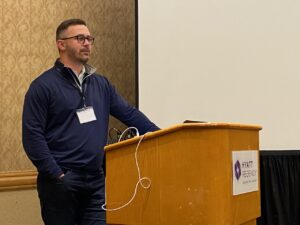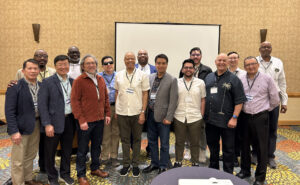
ST. LOUIS (BP)–A number of developments within the Missouri Baptist Convention have raised the specter of a contentious annual meeting Oct. 29-31 in Cape Girardeau.
The Missouri Baptist Foundation board of trustees amended the foundation’s charter Oct. 10 to give the board the responsibility of electing its own trustees. The foundation became the fourth Missouri Baptist Convention entity to take such action rather than leaving trustee selection in the hands of messengers to MBC annual meetings, where conservatives have prevailed in recent years in convention business.
Additional fallout from the state’s conservative-moderate tensions came Oct. 4 with the resignation of the convention’s executive director, Jim Hill. Hill was elected to the position in 1998 when moderates were in control of the process.
In addition to the Missouri Baptist Foundation, trustees removed the Missouri Baptist Convention from trustee selection at the Missouri Baptist College and Windermere Baptist Conference Center earlier this year and The Baptist Home for senior adults last year.
At Missouri Baptist College when trustees voted Aug. 23 to change the institution’s charter and make their board self-perpetuating, concerns arose among conservatives of a moderate/liberal takeover at the school – and escalated among conservatives over the possibility of a strategy by moderates to incorporate various agencies into a breakaway state convention at some point in the future. Windermere, for example, entails 3.5 miles of lakefront along the Lake of the Ozarks in south-central Missouri valued at more than $8 million, according to its July 2001 balance sheet. The Missouri Baptist Foundation, with four offices across the state, manages more than $142 million in assets, distributing nearly $6 million yearly to causes supported by Missouri Baptists. The Baptist Home, meanwhile, has a $40 million endowment.
Missouri Baptist College’s 16-10 trustee vote (one trustee was not present) to become self-perpetuating prompted one conservative trustee to immediately resign.
“My resignation is a matter of conviction and principle because that action created an illegitimate board and by conviction I cannot serve on such a board,” David Sheppard, pastor of First Baptist Church of St. Charles, said at the time.
Sheppard said he was unaware that such a move was being considered until he was notified by letter two weeks before the trustee meeting.
“I was totally shocked,” he said. “This was strictly a political action, not theological. I’ve served for five years as a trustee and the convention controversy has never entered into any of the trustee deliberations until this particular event.”
A news release issued by the trustees following their action cited two primary concerns.
“The first is the removal of the college from the political uncertainties and unrest surrounding the Missouri Baptist Convention,” the news release stated. “The second is the danger of ascending or descending liability that could make the college liable in a lawsuit brought against any other agency or institution of the convention. The new charter alleviates these concerns.”
The issue of protecting the school from politics is a common refrain used by moderate/liberal leaders to justify the establishment of self-perpetuating boards, yet as conservatives point out, the very action itself is political.
In Sheppard’s view, the college is “an institution of the Missouri Baptist Convention,” he said. “By its charter its trustees must have the approval of the state convention in order to change that charter and the trustees did not get it.”
The board charged college President Alton Lacey Lacey to chair a special trustee committee to meet with convention leaders and express the board’s desire to continue in partnership. Conservatives, meanwhile, may introduce a motion during the upcoming annual meeting to escrow the $950,000 the Missouri Convention provides the college each year — about 8 percent of the annual budget — if its trustees do not rescind their action.
“I think this is going to be a very difficult time for the college,” Sheppard said. “The tragedy is that the college is at its peak and I think this will prove devastating to the school. They are going to lose a great deal of their constituency here in St. Louis as well as throughout Missouri.” The college has been widely viewed as a theologically conservative institution. Established in 1964 and with more than 3,000 students, the college describes itself as “an evangelical Christian, liberal arts college.”
Conservatives also are challenging the ascending/descending liability argument in trustee actions to become self-perpetuating.
“If trustees can act autonomously — as they obviously have, then the question of ascending/descending liability is not an issue,” Jay Scribner, immediate past president of the MBC and pastor of First Baptist Church of Branson, told Baptist Press after The Baptist Home’s trustees voted to become self-perpetuating. “How can it be ascending/descending liability [to protect the convention] when they act autonomously?”
It is not known, meanwhile, how many Missouri Baptist College trustees are proponents of the Cooperative Baptist Fellowship, a denomination-like organization that broke from the Southern Baptist Convention 10 years ago. Charles Cantrell, who serves as moderator for the Missouri CBF, is a trustee along with John Anderson, former pastor of Third Baptist Church in St. Louis, a congregation that is dually aligned with the SBC and American Baptist Convention and has been sympathetic to the CBF cause in Missouri. The college’s president, Lacey, also attends Third Baptist. In addition, 25 percent of the trustees are not Southern or Missouri Baptists.
Two other Missouri Baptist Convention-affiliated schools, Southwest Baptist University in Boliver and Hannibal-LaGrange College in Hannibal, continue to have their trustees selected by the state convention.
“The moderates/liberals are telling conservatives in Missouri, ‘You may win control of the state convention, but you won’t have any agencies to run,” stated Roger Moran, research director for Project 1000, a group that has been successful in getting pro-SBC conservatives elected to state offices since 1998. “If conservatives were doing this, it would be called stealing,” said Moran, who also is a member of the SBC Executive Committee.
One response by Missouri conservatives to self-perpetuating trustee boards came in March when the MBC nominating committee announced it would impose additional criteria to those stated in convention bylaws for nominees to such boards. Under the nominating committee’s new guidelines, no more than two people from any church can serve at one time and no one can serve on more than one board at a time. The new criterion also requires all nominees to be supportive of the MBC and the SBC. Committee members said the new rules were designed to involve more churches in the convention and to break up what they described as a “good-old-boy” network system perpetuated by moderates and liberals.
Then moderates/liberals were further angered in July when the MBC nominating committee declined to re-nominate more than 20 persons eligible for second terms on convention boards and agencies.
Among the rejections were nominees from the church attended by Randy Fullerton, chairman of the board of Missouri Baptist College. More than two people from Fee Fee Baptist Church near St. Louis have been serving on multiple boards. Fullerton, for example, in addition to his chairman’s position with the college, also sits on the MBC executive committee. As a result of the nominating committee’s action, Fullerton would have had to step down from one of the positions had the Missouri Baptist College trustees not voted to become self-perpetuating.
“This is an example of how we’ve had people playing musical chairs on these boards,” Moran charged.
The effort by moderate-led agency trustees in Missouri to make their boards self-perpetuating runs counter to a state convention where conservatives have won decisive victories in last three annual meetings’ presidential elections. The presidency is important in the state because the president appoints members to the convention’s nominating committee, one-third of whom rotate off every year. It is the nominating committee who appoints trustees for state agencies and affiliated colleges. Presently two-thirds of the nominating committee are conservatives, but their impact has been thwarted by the moderate/liberal agency and college trustee self-perpetuating initiatives.
Moderates and liberals have poured considerable resources into their political efforts in recent years. Moderates, largely through anti-SBC groups like Mainstream Missouri Baptists and the Missouri Cooperative Baptist Fellowship, attempted to raise more than $350,000 in the last two years to elect moderate or liberal leaders to state convention offices. Many CBF leaders like Russell Dilday and Keith Parks have “stumped” across the “Show Me” state in attempts to build political support, but without successful results.
–30–
















